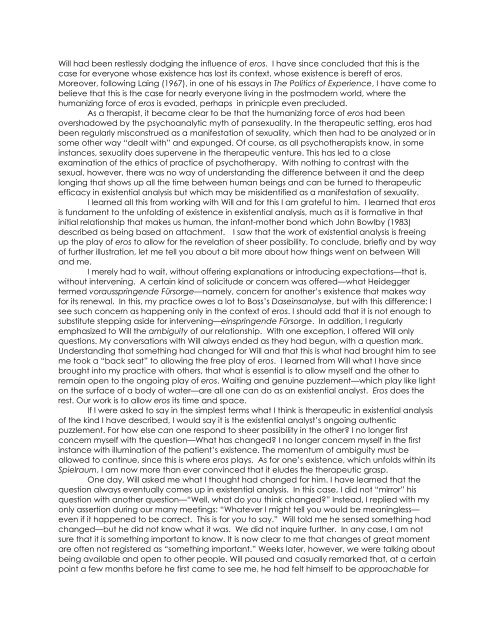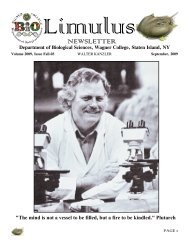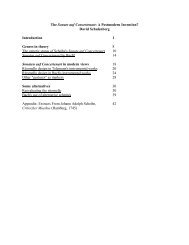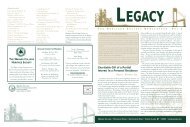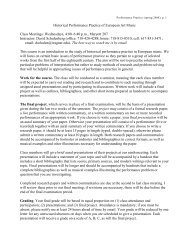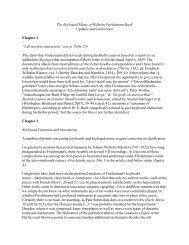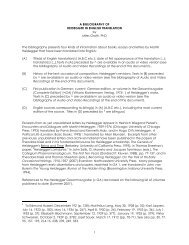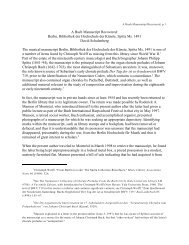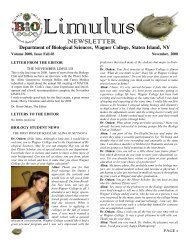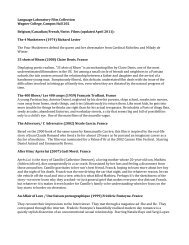SEVEN PAPERS ON EXISTENTIAL ANALYSIS ... - Wagner College
SEVEN PAPERS ON EXISTENTIAL ANALYSIS ... - Wagner College
SEVEN PAPERS ON EXISTENTIAL ANALYSIS ... - Wagner College
Create successful ePaper yourself
Turn your PDF publications into a flip-book with our unique Google optimized e-Paper software.
Will had been restlessly dodging the influence of eros. I have since concluded that this is the<br />
case for everyone whose existence has lost its context, whose existence is bereft of eros.<br />
Moreover, following Laing (1967), in one of his essays in The Politics of Experience, I have come to<br />
believe that this is the case for nearly everyone living in the postmodern world, where the<br />
humanizing force of eros is evaded, perhaps in prinicple even precluded.<br />
As a therapist, it became clear to be that the humanizing force of eros had been<br />
overshadowed by the psychoanalytic myth of pansexuality. In the therapeutic setting, eros had<br />
been regularly misconstrued as a manifestation of sexuality, which then had to be analyzed or in<br />
some other way “dealt with” and expunged. Of course, as all psychotherapists know, in some<br />
instances, sexuality does supervene in the therapeutic venture. This has led to a close<br />
examination of the ethics of practice of psychotherapy. With nothing to contrast with the<br />
sexual, however, there was no way of understanding the difference between it and the deep<br />
longing that shows up all the time between human beings and can be turned to therapeutic<br />
efficacy in existential analysis but which may be misidentified as a manifestation of sexuality.<br />
I learned all this from working with Will and for this I am grateful to him. I learned that eros<br />
is fundament to the unfolding of existence in existential analysis, much as it is formative in that<br />
initial relationship that makes us human, the infant-mother bond which John Bowlby (1983)<br />
described as being based on attachment. I saw that the work of existential analysis is freeing<br />
up the play of eros to allow for the revelation of sheer possibility. To conclude, briefly and by way<br />
of further illustration, let me tell you about a bit more about how things went on between Will<br />
and me.<br />
I merely had to wait, without offering explanations or introducing expectations—that is,<br />
without intervening. A certain kind of solicitude or concern was offered—what Heidegger<br />
termed vorausspringende Fürsorge—namely, concern for another’s existence that makes way<br />
for its renewal. In this, my practice owes a lot to Boss’s Daseinsanalyse, but with this difference: I<br />
see such concern as happening only in the context of eros. I should add that it is not enough to<br />
substitute stepping aside for intervening—einspringende Fürsorge. In addition, I regularly<br />
emphasized to Will the ambiguity of our relationship. With one exception, I offered Will only<br />
questions. My conversations with Will always ended as they had begun, with a question mark.<br />
Understanding that something had changed for Will and that this is what had brought him to see<br />
me took a “back seat” to allowing the free play of eros. I learned from Will what I have since<br />
brought into my practice with others, that what is essential is to allow myself and the other to<br />
remain open to the ongoing play of eros. Waiting and genuine puzzlement—which play like light<br />
on the surface of a body of water—are all one can do as an existential analyst. Eros does the<br />
rest. Our work is to allow eros its time and space.<br />
If I were asked to say in the simplest terms what I think is therapeutic in existential analysis<br />
of the kind I have described, I would say it is the existential analyst’s ongoing authentic<br />
puzzlement. For how else can one respond to sheer possibility in the other? I no longer first<br />
concern myself with the question—What has changed? I no longer concern myself in the first<br />
instance with illumination of the patient’s existence. The momentum of ambiguity must be<br />
allowed to continue, since this is where eros plays. As for one’s existence, which unfolds within its<br />
Spielraum, I am now more than ever convinced that it eludes the therapeutic grasp.<br />
One day, Will asked me what I thought had changed for him. I have learned that the<br />
question always eventually comes up in existential analysis. In this case, I did not “mirror” his<br />
question with another question—“Well, what do you think changed?” Instead, I replied with my<br />
only assertion during our many meetings: “Whatever I might tell you would be meaningless—<br />
even if it happened to be correct. This is for you to say.” Will told me he sensed something had<br />
changed—but he did not know what it was. We did not inquire further. In any case, I am not<br />
sure that it is something important to know. It is now clear to me that changes of great moment<br />
are often not registered as “something important.” Weeks later, however, we were talking about<br />
being available and open to other people. Will paused and casually remarked that, at a certain<br />
point a few months before he first came to see me, he had felt himself to be approachable for


